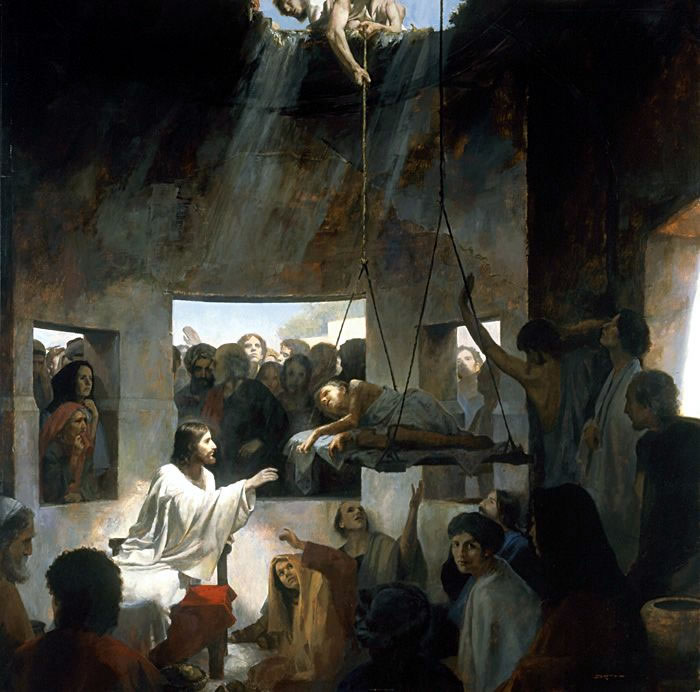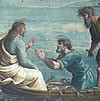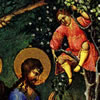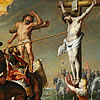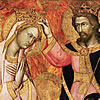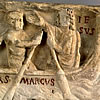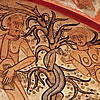Jesus Revealing Himself
Christians believe Jesus’ claim to be God because he consistently spoke and acted in the person of God. The healing of the paralytic in Mark 2:1-9 (also Matthew 9:1-8) is a really good example because of the visual evidence.
In this account, a paralytic on a bed is brought to Jesus who tells him his sins are forgiven. To us it is quite odd that Jesus would forgive his sins when he came there to be healed of his paralysis, but to the Jews of that time it made sense. For them a person undergoing any suffering, illness, or disease is attributed to God’s punishment as a result of their sins. We can read this sentiment in the Book of Job when his friends insist that Job must have done something sinful to warrant his suffering. (This sentiment, of course, is not a Christian sentiment because we trust God brings a greater good out of our suffering.)
So in the eyes of all those present, the paralytic must be a sinful man because God allowed this suffering on him. Thus, it made sense that Jesus would forgive him.
But in the account, the scribes think this is blasphemy because it is only the transgressed – God in this case – who can forgive it; and that makes perfect sense. Jesus knows what is in their hearts (and ours) so he gives them proof – the healing of the man whose sins he just forgave. This is perfect evidence because if God allowed suffering for sin, then God can remove suffering if a man is clean of sin. Thus, when he cured the paralytic it would mean, to them, that the man no longer has sin. That should be proof indeed that Jesus is God because he can forgive sins as easily as he can remove the effects of sin.
The problem with the scribes and Pharisees of that time is that even when faced with evidence like this, they refuse to budge from their pre-conceived ideas of God. We fall into this trap too even today. We have a pre-conceived idea of what God is, and so we don’t allow him to show us who he really is. We box him in our own image of him. The cure to this is to allow him to show us his wonderful awesomeness and mercy. Maybe the next time something good or bad happens to us, let us give it some afterthought and ask ourselves what good it has done in our lives. We can only do that, though, if we stop, shut off the world for a few minutes, and meditate on these things.
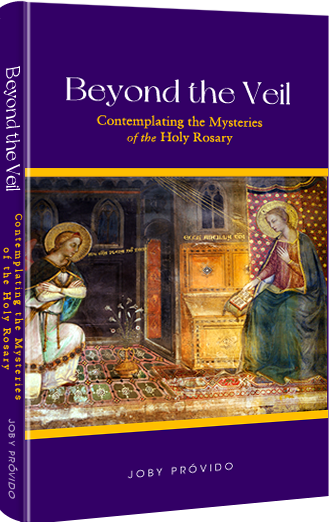
Beyond the Veil
Contemplating the Mysteries of the Holy Rosary
Prayer giants like Pope St. John Paul II, Pope Paul VI, Bl. Archbishop Fulton Sheen, and Bishop Robert Baron advocate that we contemplate on the mysteries of the rosary while we say the vocal prayers. Unfortunately, there are not many books that teach us how to do this. Beyond the Veil comes to the rescue by suggesting seven ways we can pray the rosary the way it was intended.
The larger part of the book offers mental images for each of the mysteries we can use in our contemplation, for how can we imagine the scenes in the rosary if we don't know about them?
Get your copy now either in Hardbound, Paperback, or Kindle
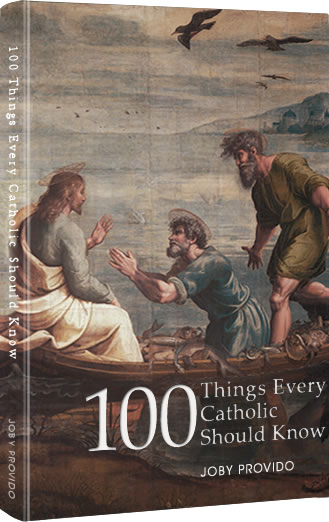
100 Things Every Catholic Should Know
Whether or not you are new to the Catholic Church, or struggling, or lapsed, or dynamically involved, this book will enlighten you with the essentials of the Faith that have been handed down to us by the apostles.
Each of the 100 topics is easy to read and distilled into bite-sized portions. Through cross-referencing, the book also shows how the topics are interrelated. Those who are new to the Faith will find this book an edifying handy reference, and those who have simply forgotten will find it a great review material that might spark a new love for God and religion.
Get your copy now either in Hardbound, Paperback, or Kindle

Typology for Beginners
A Catholic Perspective on understanding the New Testament through the Old Testament
First-century Jews converted to Christianity in droves because of the way the New Testament was written to show Jesus was the Messiah promised by the Old Testament. We also learn about how Mary is the New Eve and the Ark of the Covenant in the way the writers portray her.
Through typology, the patterns that connect the Old and New Testaments make the Bible stories more accessible so that one becomes excited to read Sacred Scripture again.
Get your copy now either in Hardbound, Paperback, or Kindle

A Sky Full of Stars
Know Our Lady through her Titles in the Litany
The Church helps us understand who Mary is by honoring her with different titles in the Litany of the Blessed Virgin Mary. Unfortunately, over time and difference of culture, we might not grasp what it is the Church is ascribing to her and lose that opportinity to get to know her.
In A Sky Full of Stars, each title of the Litany is explained so we get know Mary more and fall in love with her all over again.
Get your copy now either in Hardbound, Paperback, or Kindle


